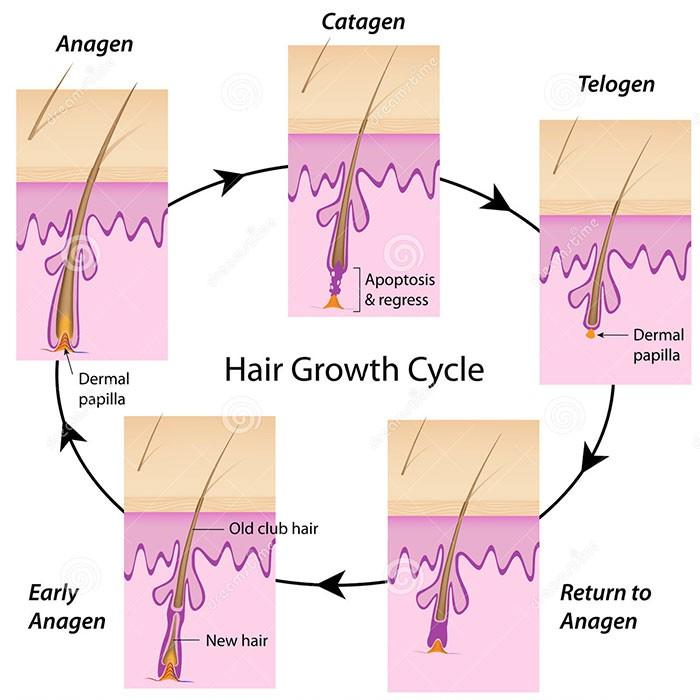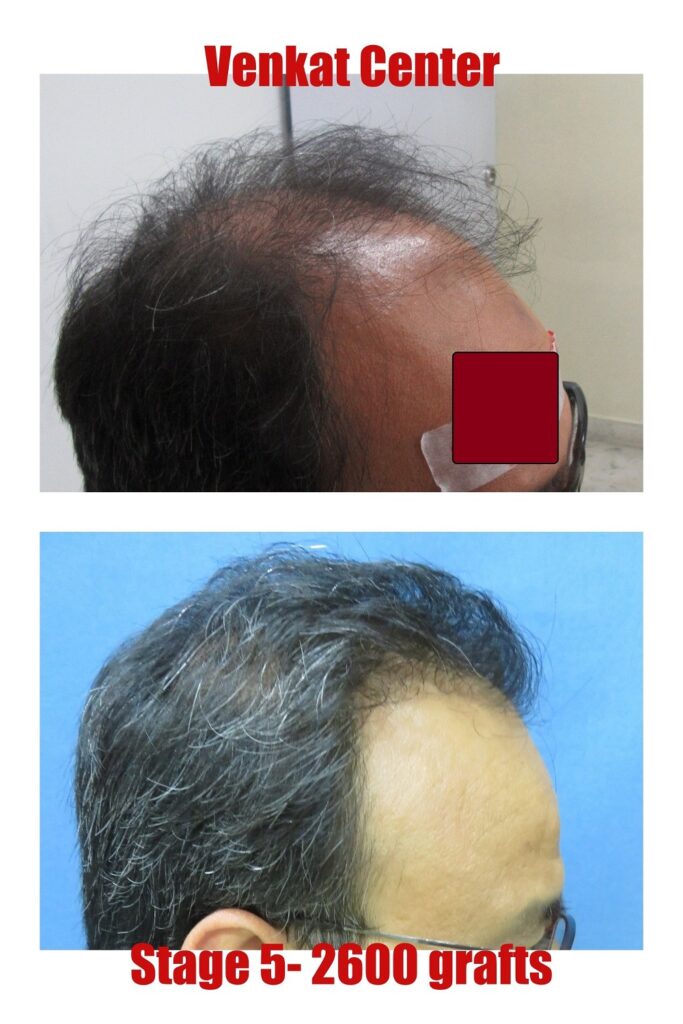Human hair grows in a continuous cyclic pattern of growth and rest known as the hair growth cycle. Three phases of the cycle exist: Anagen= growth phase; Catagen= degradation phase; Telogen = resting phase. This cycle applies to all hair in the body, though their duration may vary in different areas of the body. This means that a few hairs often up to 50-100 hairs may be lost every day. This is called normal hair loss and does not need any treatment.
What are the phases of the hair cycle?
Periods of growth (anagen) are followed by a brief period, two to four weeks, in which the follicle is almost totally degraded (catagen). During the growing phase, which lasts between two and six years depending on genetic factors and age, hair grows approximately one cm each month. The resting phase (telogen) then begins and lasts two to four months.
Shedding of hair occurs only after the next growth cycle begins and a new hair shaft begins to emerge. On average, 50-100 telogen hairs are shed every day. This is normal hair loss and accounts for the hair loss seen every day in the shower and with hair combing. These hairs will regrow. At any given moment, about 90 percent of these follicles are in the anagen, or growing phase and not more than 10 percent of the follicles are in the resting phase (telogen) at any time. The prolonged growth phase and the high percentage of hairs in growth phase are responsible for the long hairs on the scalp.
These factors mean that any treatment would take several weeks (six to twelve) for showing response and hence patients need to have patience and persist with the treatment.

This cycle is controlled by a number of factors such as hormonal and diet factors, stress etc. Of these, androgens (male hormones-testosterone, dihydrotestosterone) are the most important control factors of human hair growth, both in men and women. Androgens must be present for the growth of beard, axillary (underarm), and pubic hair. Paradoxically, androgens cause loss of hair on the scalp in men.
What should I do to avoid hair loss?
Various chemical treatments on the hair, including dyes, tints, bleaches, straighteners and permanent waves may cause the hair to become weak and break if any of these chemicals are used too often. Hair can also break if the solution is left on too long, if two procedures are done on the same day, or if bleach is applied to previously bleached hair. If hair becomes brittle from chemical treatments, it’s best to stop until the hair has grown out.
Hairstyles that pull on the hair, like ponytails and braids, should not be pulled tightly and should be alternated with looser hairstyles. The constant pull causes some hair loss, especially along the sides of the scalp.
Frequent Shampooing, combing and brushing too often, using a hot air dryer can also damage hair, causing it to break. Using a cream rinse or conditioner after shampooing will make it easier to comb and more manageable. When hair is wet, it is more fragile, so vigorous rubbing with a towel, rough combing and brushing should be avoided. Use wide toothed combs and brushes with smooth tips.
HELMETS, SWEATING, CAPS, DANDRUFF, LEAVING HAIRS, WATER, SWIMMING, DO NOT CAUSE HAIR LOSS.
Hair Loss Causes
Many conditions, diseases, and improper hair care result in excessive hair loss. These causes could be in the hair, scalp, body or even the mind.
People who notice their hair shedding in large amounts after combing or brushing, or whose hair becomes thinner or develop patches , should consult a dermatologist. With the correct diagnosis, most people with hair loss can be helped.
It is important to note that all hair loss cases do not result in baldness- in fact most do not result in baldness.
How is hair loss evaluated?
At Venkat Center, we evaluate a patient’s hair problem by:
Asking questions about diet, medications including vitamins and health food taken in the last six months, family history of hair loss, recent illness and hair care habits. Questions are also asked about systemic diseases such as thyroid and importantly about stress and tensions. Hormonal effects may be evaluated in women by asking about menstrual cycles, pregnancies, and menopause.
Next a detailed examination of the scalp is performed. We may then do a few simple tests:
- Hair pull test: 100 hairsar epulled for one minute to see how many hairs come out-of more than 10 hairs come out, it is significant.
- We also may check a few hairs under the microscope.
- Other investigations that are performed include trichoscan and trichogram. Trichoscan or hair scan is done to assess the density, type of units, weakness in the roots, assess the number of miniature hairs and response to treatment. A trichoscan or hair scan is a simple test to detect miniaturization, and thereby estimate whether there is likely possibility of permanent baldness. It takes only 10 minutes to perform.
Sometimes blood tests to detect anemia or a thyroid problem may need to be done. Occasionally, a scalp biopsy may be required for an accurate diagnosis. It’s important to find the cause and whether the problem will respond to medical treatment. It should be understood that hair problems are not just cosmetic – THEY CAN BE MEDICAL – and hence need to be considered seriously.
What causes temporary hairfall?
Most cases of hairloss are temporary. Emotional turmoil, medications, skin conditions, surgery, childbirth, poor nutrition, and illnesses can cause hair follicles to enter the telogen phase prematurely, resulting in increased shedding which presents itself as temporary diffuse thinning.
What medical conditions cause hairfall?
Among the many hair loss causes, the most common of the medical conditions that can cause hair loss are:
- Anemia
- Thyroid disease
- Other endocrine problems (especially those that produce excess androgens)
- Gynecological conditions – such as ovarian tumors
- Connective tissue disease (such as Lupus)
- Surgical procedures and general anaesthesia
- Rapid weight loss or crash diets that are not nutritionally balanced
- Severe emotional stress
- Drugs such as oral contraceptives, thyroid medication, blood pressure medication (such as beta-blockers or water pills), “mood” medication such as lithium, Prozac, or tricyclic antidepressants, blood thinners such as heparin or coumadin, cholesterol-lowering medication. The treatment of all these medical causes of hair loss(which never cause total baldness) is that of the underlying cause.
What is localized hair loss?
Hair loss can be generalized or localized. Localized hair loss may be sub-divided into scarring and non-scarring types.
Alopecia Areata is a genetic, auto-immune disease that typifies the non-scarring type. It manifests itself with the sudden onset of round patches of hair loss associated with normal skin and can be treated with local injections of Cortico-steroids. Fungal infections can cause hair loss in children.
Scarring Alopecia can be caused by a variety of medical or dermatological conditions such as Lupus and Lichen Planus, or local radiation therapy. Baldness from injuries, or from local medical problems that have been cured, is usually amenable to hair transplantation.
Traction Alopecia is the hair loss that occurs with constant tugging on the hair, in some beauty treatments. Contrary to popular belief, hair loss causes do not include dandruff. Likewise, type of water, frequent shampooing, oiling the scalp do not affect hair growth at all. Various shampoos which claim to make the hair grow have no basis.
FAQ | How do I care for my hair?
- Does shampoo/soap nut powder cause hair loss? Shampooing/soap nut powder do not cause hair growth or hair loss. Cleanse the hair regularly (at least twice a week) by using a shampoo. Don’t use soaps to wash the hair as they make the hair dry & susceptible to breakage. Shampoos are used only to cleanse the hairs and make them manageable. Any shampoo that suits you is ok.
- Don’t manipulate your hair too much with cosmetic products.
- Don’t comb the hair when wet as it can cause hair shaft damage.
- Which oil to use for my hair? Oiling the hair does not cause hair growth, oil acts as a conditioner for the hair, and make it look shiny and also easy to manage, & avoids split ends, thus oiling the hair is only for grooming & not for growing. There is no particular oil that is specifically prescribed for hair as all oils do the same job.
- Allow hair to air dry in the sun, avoid hot hair dryer, because heat causes hair shaft damage.
- Will long hair cause hair loss? No. Long hair doesn’t fall more than regular hair.
- Use a wide-toothed comb with blunt bristles as it avoids friction between the hairs & the comb bristles.
- Don’t tie the hairs very tight as it can cause tractional alopecia.
- Protect your hair from environmental assaults like dust, wind & pollution– they make the hair dry.
- Does dandruff cause hair loss? No. Dandruff does not cause hair loss.
- Does helmet cause hair loss? No. Use of helmet does not cause hair loss.
- Does shaving the head increase hair growth? No. Shaving the head does not increase hair growth.
- Remember; all of us have a normal hair loss up to 50 hairs a day – this does not need treatment.
- Most hair loss is temporary hair loss – which can be fully treated.
- Does smoking cause hair loss? Yes. Smoking can increase hair loss due to decreased blood flow to the hair roots.
- Does exercise help hair growth? Yes. Daily aerobics may help to reduce hair loss. However, muscle build exercise may increase hair loss.
- Which food to avoid? Foods like chocolates, pastries, red meat, bakery foods, Chinese food rich in Ajinomoto, soft drinks, artificial sweeteners, preservatives, can all increase free radical levels in the body and affect hair growth & cause increased hair loss.
- Which food to prefer for healthy hair? Foods rich in sprouts, green leafy vegetables, salads, fresh fruits, pulses and plenty of water all help in giving healthy & glowing hair.
- Does hard water cause hair loss? Hard water contains minerals which accumulate of hair shaft leading to the coloring of hair and breakage. It can make the hair shaft dry and brittle due to deposition of salts and minerals. however, hard water does not affect roots.
- Does Stress cause hairloss? Yes, absolutely. Stress is a major cause for hairloss.
- Does smoking cause hair loss? Yes, Nicotine leads to decreased blood supply, affect multiplication of cells, and hence affect growth.
Instructions for shampooing the hair: Apply an adequate amount of shampoo on to the wet scalp and work out the lather. Leave the lather on scalp for 5–10 mins and then wash thoroughly with water. Shampoo the hair twice a week.
Instructions for conditioning the hair: Conditioner moistens the hair, and makes them soft, and are applied after the shampoo; apply conditioner for a few minutes and then rinse.

About The Doctor
Dr. Venkataram Mysore was one of the first surgeons to learn this technique in the country. He is an expert in FUT and is one of the most respected Hair Transplant experts in the world. He has edited the first Indian textbook on the subject and is the first and only Indian Dermatologist to be made a fellow of the International Society of Hair Restoration Surgeons.




